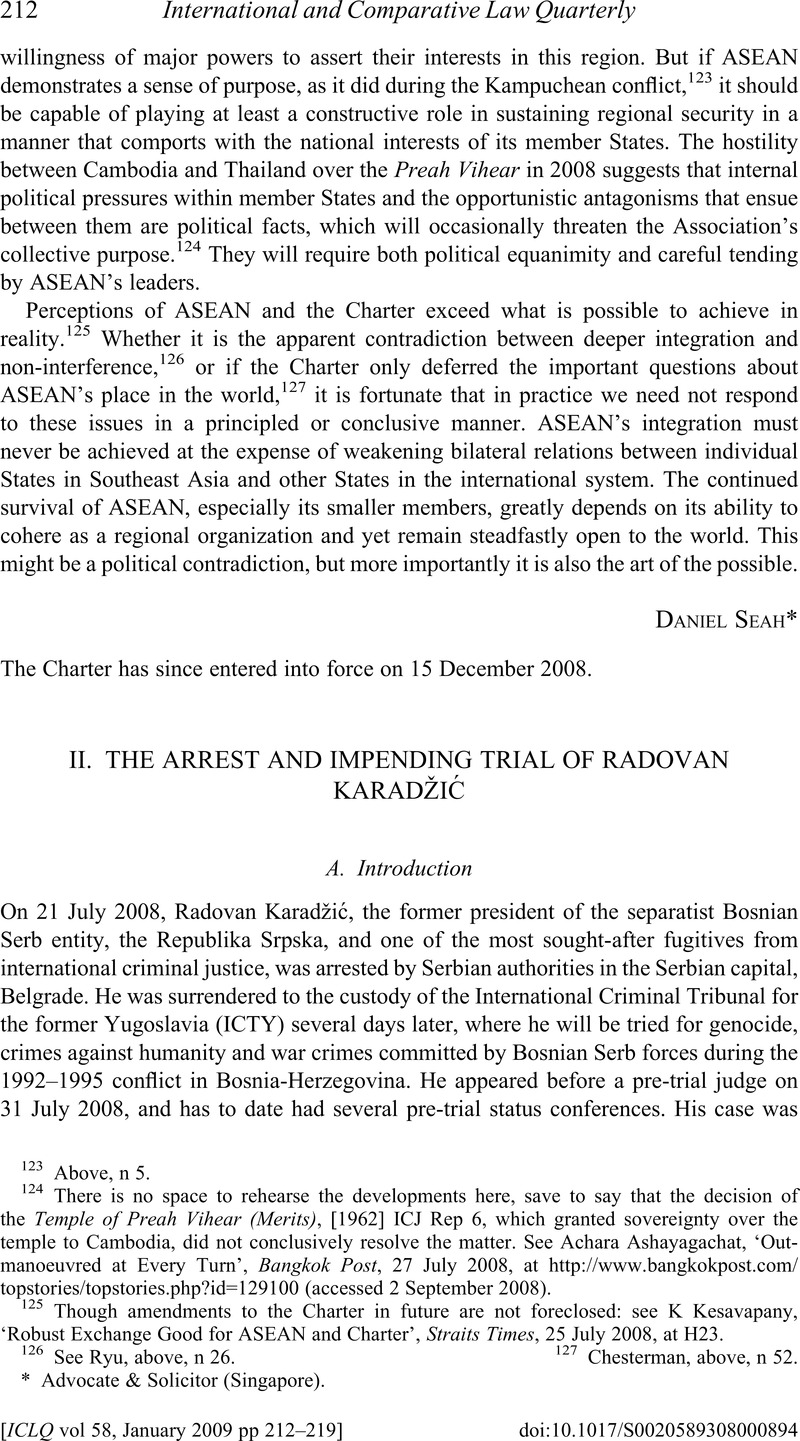Article contents
II. THE ARREST AND IMPENDING TRIAL OF RADOVAN KARADŽIĆ
Published online by Cambridge University Press: 06 February 2009
Abstract

- Type
- Current Developments: Public International Law
- Information
- Copyright
- Copyright © 2009 British Institute of International and Comparative Law
References
1 See M Sadovic, ‘Judge Orie Taken Off Karadžić Trial,’ IWPR, 22 August 2008, available at http://www.iwpr.net/?p=tri&s=f&o=346382&apc_state=henitri200808. Karadžić had requested Judge Orie to be removed from the case alleging that he could be biased as, being Dutch, he might have a personal interest in the Srebrenica case, and that he presided over the Krajišnik case, closely interwoven with Karadžić's own. The President of the Tribunal, Fausto Pocar, said the decision on reassignment was solely taken to advance a better division of the workload.
2 See ‘Secret Life of Radovan Karadžić’, BBC News, 25 July 2008, available at http://news.bbc.co.uk/1/hi/world/europe/7520661.stm.
3 Prosecutor v Karadžić, IT-95-5, Amended Indictment, 28 April 2000. All case materials available at http://www.un.org/icty/.
4 Prosecutor v Karadžić, IT-95-5/18-PT, Motion to Amend the First Amended Indictment, 22 September 2008.
5 Prosecutor v Krstić IT-98-33, Trial Chamber Judgment, 2 August 2001; Appeals Chamber Judgment, 19 April 2004.
6 Case Concerning the Application of the Convention on the Prevention and Punishment of the Crime of Genocide (Bosnia and Herzegovina v Serbia and Montenegro) Judgment of 27 February 2007 (not yet published), available at www.icj-cij.org (hereinafter Genocide judgment) paras 276–277, 297. See also D McGoldrick, ‘State Identity and Genocide: The Bosnian Genocide Case’ in K Kaikobad and M Bohlander (eds), International Law and Power: Perspectives on Legal Order and Justice—Essays in Honour of Colin Warbrick (Leiden, Brill, 2008, forthcoming).
7 Prosecutor v Krajišnik, IT-00-39, Trial Chamber Judgment, 27 September 2006, esp. paras 867–869.
8 See V Dimitrijević & M Milanović, ‘The Strange Story of the Bosnian Genocide Case' (2008) 21 Leiden Journal of International Law 65, esp. 67, fn 9.
9 Genocide judgment, para 394.
10 See Prosecutor v Karadžić IT-95-5, Submission of Radovan Karadžić to Judge Orie, 6 August 2008. See also S Jennings, ‘Should ICTY Probe Karadžić Immunity Deal Claims?’ IWPR, 19 September 2008, available at http://www.iwpr.net/?p=tri&s=f&o=346776&apc_state=henh.
11 Prosecutor v Karadžić, IT-95-5, Status Conference Transcript, 17 September 2008, available at http://www.un.org/icty/transe5&18/080917SC.htm: ‘THE ACCUSED: … [A]s for the question of immunity, I would like to ask that this Trial Chamber not make a ruling on that subject because I have initiated an investigation because Mr. Holbrooke wasn‘t speaking only in the name of America, but it was agreed upon by all the members of the Security Council. So he was speaking on behalf of the Contact Group as well. … E]verything that was done by Mr. Holbrooke led to a Security Council resolution. He was working on behalf of the Contact Group and the Security Council. That is to say that this is not an issue that can be dismissed simply as a unilateral, or rather, bilateral agreement between myself and the United States. Everything that Holbrooke did led to resolutions and activity on the part of the Security Council, that is to say he did act on behalf of the permanent members of the Security Council. That's the point.’
12 See generally Zahar, A, ‘Legal Aid, Self-Representation and the Crisis at The Hague Tribunal’ (2008) 19 Criminal Law Forum 241CrossRefGoogle Scholar; Sluiter, G, ‘Compromising the Authority of International Criminal Justice—How Vojislav Šešelj Runs His Trial’ (2007) 5 Journal of International Criminal Justice 529CrossRefGoogle Scholar.
13 See Zahar (n 12) 254 ff, esp 262.
14 Art 21(4)(d) of the ICTY Statute and Art 14(3)(4) of the ICCPR provide that the accused shall have the right ‘to be tried in his presence, and to defend himself in person or through legal assistance of his own choosing; to be informed, if he does not have legal assistance, of this right; and to have legal assistance assigned to him, in any case where the interests of justice so require, and without payment by him in any such case if he does not have sufficient means to pay for it’ (emphasis added).
15 On self-representation see also G Boas, The Milošević Trial: Lessons for the Conduct of Complex International Criminal Proceedings (Cambridge, CUP, 2007) 57–63.
16 See also S Jennings, ‘Karadžić Determined to Represent Himself’, IWPR, 19 September 2008, available at http://www.iwpr.net/?p=tri&s=f&o=346780&apc_state=henh.
17 Prosecutor v Karadžić, IT-95-5, Status Conference Transcript, 17 September 2008, available at http://www.un.org/icty/transe5&18/080917SC.htm: ‘JUDGE BONOMY: … There is precedent in this Tribunal for an accused person to participate actively in the presentation of his own defence, even where he has counsel also actively conducting the case in conjunction with him. Now, it's for the Trial Chamber—and in this case I think it would be for the Chamber in the pre-trial phase—to consider and approve appropriate arrangements for individual cases. So there is no absolute choice, simple, absolute choice, between being there on your own, trying to do everything in court on your own, and being represented in court by someone else and having to remain silent; there are other options.’
18 ibid.
19 ibid.
20 See generally G Boas, The Milošević Trial: Lessons for the Conduct of Complex International Criminal Proceedings (Cambridge, CUP, 2007); D McGoldrick, ‘The Trial of Slobodan Milosevic: A Twenty-First Century Trial?’ in R Melikan (ed) Trials in History: International and Domestic Trials (Manchester University Press, 2003) 179–94.
21 See (n 12).
- 3
- Cited by




